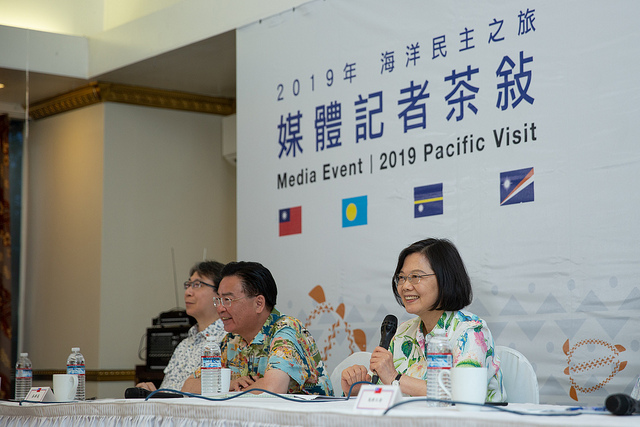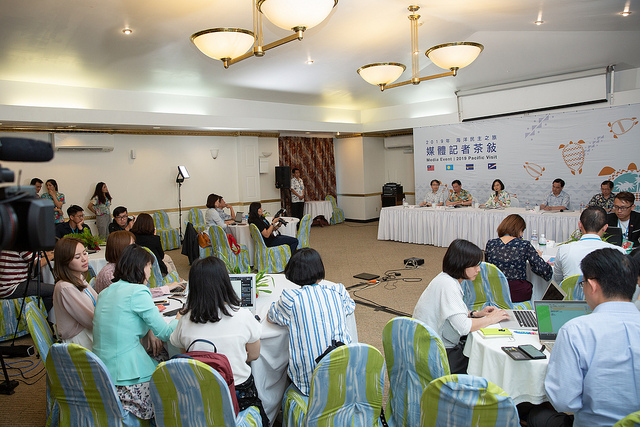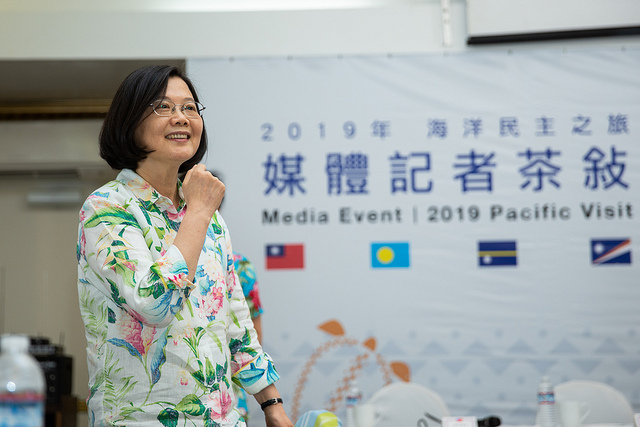News & activities
 News releases
News releases
On the evening of March 26 (afternoon of March 26 Taipei time), President Tsai Ing-wen held a reception in the Marshall Islands for the press corps traveling with her "Oceans of Democracy" delegation. At the gathering, she detailed the trip's achievements and responded to questions from reporters.
In remarks, President Tsai said that the Marshall Islands was the third stop of her visits, and also the last stop of the three diplomatic allies in the South Pacific, and that they would depart the next day for a transit stop in Hawaii on their way back to Taiwan. Noting that Taiwan has six diplomatic allies in Oceania, the president said that the ROC (Taiwan) flag flew along the roadsides in each of the three countries she visited, and children waving our national flags also lined the routes she traveled. Taiwan engages in extensive cooperation and interaction with these countries in such fields as healthcare, agriculture, vocational training, and renewable energy.
For these countries, said President Tsai, Taiwan is an important cooperative partner, mainly because we maintain a shared belief in democracy and harbor many of the same ideals. In particular, we are all island nations, and the greatest challenge to South Pacific island nations today is climate change. Sea levels continue to rise closer to island shores. Global climate change and rising temperatures pose challenges to these countries that also serve as a warning for the rest of us, and we can use our strengths to work together with them to face these many challenges.
President Tsai said that the members of the traveling press corps would all no doubt have their own views regarding the countries they had visited. Palau, for example, has always attached great importance to tourism, and was once boycotted by China on account of its diplomatic relationship with Taiwan, yet it has continued to maintain ties with us. We have also seen their commitment to environmental sustainability: Palau has introduced the Palau Pledge, prohibited the use of reef-toxic sunscreen, and is committed to dolphin conservation.
The president mentioned that the presence of international research teams studying coral reefs in Palau made a deep impression upon her. Palau was long a major producer of coral, but due to climate change, Palau's coral population was cut nearly in half. However, the nation has managed to keep the coral in Neco Bay very much intact, which has been meaningful to scientists and environmentalists alike. Their studies are useful for countries throughout the world, and many of their concerns are quite new to us.
President Tsai thanked the government of Palau for the support it has given Taiwan in the international community. Besides continuing to cooperate with Palau in pursuit of economic and social development, there is much that Taiwan can learn from Palau in the area of sustainable development. Similarly, Nauru President Baron Waqa has also remained steadfast in his commitment to democracy, and has lent his staunch support to Taiwan, despite facing heavy pressure from China. These small countries displayed particular courage by speaking up for Taiwan at the Pacific Islands Forum (PIF). The Nauru Parliament's passage of a resolution opposing China's "one country, two systems" model for Taiwan on March 25 also took immense courage. Their actions also provide powerful support for Taiwan in the international community, she said.
President Tsai then mentioned that the Marshall Islands also faces the challenge of climate change, and is similarly pursuing sustainable development. At the Pacific Women Leaders' Coalition Conference that day, many speakers offered keen insights on women issues. Indeed, the discussions were comparable to similar discourse anywhere else in the world in terms of depth and breadth; moreover, they reflected the issues facing women in this region, and how we should be thinking about and dealing with them. The discussions left a deep impression on her, said the president, adding that Taiwan is also a maritime nation, and the experiences of our diplomatic allies in the Pacific deserve serious thought back home.
Noting that officials from Taiwan's Coast Guard Administration were part of the delegation, President Tsai mentioned that during this trip Taiwan signed agreements for coast guard cooperation with Palau and Nauru. Taiwan, she said, hopes to engage in collaboration on oceanic research, humanitarian aid, and other such activities to establish close links among its partners in the Indo-Pacific region, for there are many other areas in which we could cooperate. The president said that Taiwan will continue to discuss such matters with like-minded nations so that our resources can be directed with greater precision to exactly where they are needed in Oceania, and cooperation projects can yield better results.
Taiwan's Foreign Minister Joseph Wu (吳釗燮), in remarks of his own, said that everyone could no doubt appreciate the difficulty of Taiwan's diplomatic position, but he also expressed confidence that everyone is encouraged to see Taiwan achieve diplomatic success. For example, Matt Pottinger, Senior Director for Asian Affairs at the US White House National Security Council, recently appeared alongside our Deputy Foreign Minister Hsu Szu-chien (徐斯儉) in a photo taken in the Solomon Islands, and the photo was publicly released by the United States. Also, not long ago at Taiwan's Ministry of Foreign Affairs, American Institute in Taiwan Taipei Office Director William Brent Christensen jointly conducted a press conference with Foreign Minister Wu. And in a recent statement to the Micronesia Presidents' Summit, US Secretary of State Mike Pompeo spoke in strong praise of Taiwan, describing our country as "a democratic success story, a reliable partner, and a force for good in the world."
Foreign Minister Wu said that it is encouraging to hear such praise for Taiwan because it means that our diplomatic efforts have been well received by the international community. Secretary Pompeo's remarks, in particular, are a source of strength that helps Taiwan to work unflaggingly toward achieving our objectives. Because our friends feel Taiwan is a force for good in the world, we must work to identify ways we can contribute more to the international community. For example, Taiwan boasts a high standard of medical care, so engaging in medical cooperation with diplomatic allies to raise the level of medical care in their countries is one way to act as a force for good in the international community.
Minister Wu further stated that last year at the PIF, he announced the establishment of a special medical fund subsidizing professional medical teams traveling to the forum's member states to provide medical services, a plan that received much praise from PIF participants. Taiwan's agricultural capabilities are outstanding as well, he said, and our agricultural technical missions are helping to better these people's lives and their eating habits, contributions that have been widely lauded by our allies. Taiwan has also contributed to women's rights in the Marshall Islands.
Minister Wu pointed out that these state visits have offered ample proof of Taiwan's positive impact. By working with like-minded countries, Taiwan's democratic success story and our progressive power are being seen and recognized around the world. For Taiwan, diplomacy means making friends around the world, and that is our responsibility, he said. On this trip, he continued, we made new friends and solidified relationships with our diplomatic allies, and that is what our administration wants to show the people.
National Security Council Deputy Secretary-General Tsai Ming-yen (蔡明彥) further detailed the meaning of this round of state visits. He said that the main theme of President Tsai's trip was "Oceans of Democracy," and that all the countries they visited are maritime nations. Maritime nations in the Indo-Pacific are attaching growing importance to issues of maritime governance and security, most importantly sustainable development, environmental conservation, judicial cooperation, and the fight against maritime crime.
Deputy Secretary-General Tsai said that Palau, the site of their first stop, will be hosting the 2020 "Our Oceans Conference," with a mission of promoting maritime conservation and sustainable development. Today, the delegation left Nauru, which hosted a major regional conference on strengthening cross-border law enforcement and crime crackdown mechanisms last year. They also visited a memorial to the Boe Declaration, an important commitment to maritime collaboration, on March 25.
Deputy Secretary-General Tsai pointed out that Taiwan can develop mutually beneficial relationships with allies in the South Pacific regarding maritime governance and security. Our South Pacific allies have a wonderful vision for our oceans, but they lack the capacity and resources. In Taiwan's case, he said, we have relatively greater capacity and resources at our disposal, but we lack international links and experience in multilateral collaboration. Thus, by working with our allies in the South Pacific on issues of maritime governance or security, we can assist in the buildup of their maritime governance capacities, and also play a more active role in linking and contributing to the region.
Deputy Secretary-General Tsai also mentioned that Taiwan signed coast guard cooperation agreements with multiple South Pacific allies over the course of this trip. Going forward, he said, we will promote personnel exchanges with these countries, and draw up cooperative plans to enhance their law enforcement and maritime research capabilities. As a member of the Indo-Pacific, Taiwan is highly interconnected with maritime governance issues, and we should not be excluded. We also hope to develop reliable partnerships with these countries in maritime governance, based on the foundations we laid on these state visits.
Moving on, Deputy Secretary-General Tsai explained that this trip had another important meaning in that all of the countries they visited share values of democracy and freedom with Taiwan, and they all pursue good governance goals. Thus, a large portion of our cooperative projects focus on public medicine and health, development of agricultural technologies, women's empowerment, and renewable resources. He expressed hope that Taiwan will follow a path of diplomacy based on ideals and values, rather than engaging in checkbook diplomacy. Diplomacy based on ideals and values, he said, is concerned with international responsibility and capacity building and sharing, while checkbook diplomacy often devolves into so-called "handouts" or "bribery."
Deputy Secretary-General Tsai pointed out that over the past few years, our collaborative good governance projects have made progress, and our allies greatly value cooperating and partnering with us in various public venues. They often speak up for Taiwan in international organizations and in the international community as a whole. For instance, our allies cooperate with us on public health and medicine through mechanisms and platforms provided by the World Health Organization, and they speak up for their belief that Taiwan should not be excluded. At events organized under the United Nations Framework Convention on Climate Change, our allies often speak up for us as well. They receive immense pressure from Beijing for their support of Taiwan, and we are thankful for our continued partnerships with them. Our diplomacy with these allies will continue to develop around our values and ideals, based on the foundations we established on these state visits.
When asked whether the delegation chose to visit South Pacific allies in response to US Indo-Pacific strategy, the president responded by saying that we have a long history of relations with these countries. We share many of the same values, she said, and we provide each other with mutual support based on these values. Our allies speak up for us in the international community, and we work together on shared economic, social, and sustainable development issues.
The president further pointed out that it is impossible to deny that this region's strategic importance has continued to grow over the past few years, and countries in the region have begun to consider what values they can collaborate on with other countries outside of national development and survival. These national and regional values closely match the values we have showcased in our bilateral cooperation with our allies, including sustainability, capacity building, women's empowerment, democracy, and environmental protection.
Our longstanding ideals and values-based bilateral cooperation and mutual assistance with our allies cover issues that have already come to carry important meaning for the region and Indo-Pacific strategy. This naturally leads to a trend of conversion, she said, and this development occurs quite naturally.
In response to questions about US Coast Guard vessels transiting through the Taiwan Strait for the first time, the president said that by continuing to perform such actions, the United States seeks to demonstrate their commitment to the right to freedom of navigation. Our national defense systems are fully aware of these maneuvers, and will continue to closely monitor the situation, she said. However, she noted, the United States' views on freedom of navigation align completely with ours.
Among those accompanying the president to the reception were Foreign Minister Joseph Wu, National Security Council Deputy Secretary-General Tsai Ming-yen, Council of Indigenous Peoples Minister Icyang Parod (夷將.拔路兒), and Ambassador to the Marshall Islands Jeffrey S.C. Hsiao (蕭勝中).











